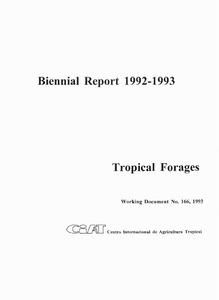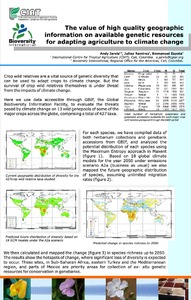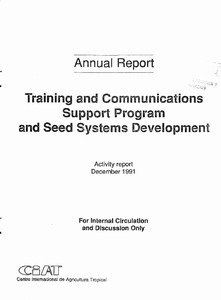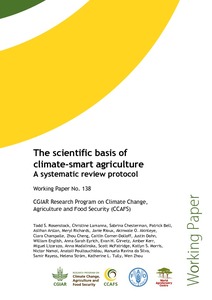agriculture
AGROVOC URI: http://aims.fao.org/aos/agrovoc/c_203
Trends and Outlook: Agricultural Water Management in southern Africa. Country report - South Africa. [Project report submitted to United States Agency for International Development’s (USAID’s) Feed the Future Program].
Trends and Outlook: Agricultural Water Management in southern Africa. Country report - Zambia. [Project report submitted to United States Agency for International Development’s (USAID’s) Feed the Future Program].
Tropical Forages Biennial report 1992-1993
The Tribe - Platform of participatory local development and management of communal rangeland resources
Sustainable development of pastoral and agro-pastoral systems, dominated by collective and/or tribal ownership of rangelands, is a key issue for the West Asia and North Africa region. These two systems are located in arid and semi-arid areas and are increasingly threatened by desertification process. The policy responses to tackle this complexity have been a sectorial and fragmented, “top-down” approach, putting forward technical solutions and neglecting the social context.
The vulnerability of native rangeland plant species to global climate change in the West Asia and North African regions
This study aimed to evaluate the impact of climate change on the geographical distribution of selected native species from two areas from West Asia and North Africa. Three species representing two genera were selected for assessment of their vulnerability to climate change. The first species was Salsola vermiculata L. which is common to both study areas. The second genus was represented by two species, Haloxylon salicornicum (Moq.) Bunge from the Syrian rangelands and H. schmittianum Pomel from southern Tunisia.
Training and Communications Support Program Annual Report 1991
The Mara-Serengeti Ecosystem and Greater Maasailand: Building the Role of Local Leaders, Institutions, and Communities
Much of the effort to include communities in conservation of large
landscapes has been driven by interests outside the savannas, either by national
governments, NGOs, or foreign conservationists (Neumann 2002,
Brockington et al. 2008). Once included in conservation planning only as
an afterthought, local communities are now major stakeholders. However,
initiatives driven, led, and managed by local leaders, communities, and institutions
to meet the needs of both wildlife and people remain rare. The
The participation of women and children in Latin American and Caribbean agriculture
This paper reviews the literature on the participation of women and children in agricultural activities in Latin America and the Caribbean. The review focuses on participation through labor in agriculture overall and in certain agricultural activities in particular. Also reviewed are the rural family`s access to and capacity for decision-making on resources. Factors influencing such participation are analyzed, such as farm size, land ownership, income levels, racial origin, and destiny of production.
The potential and uptake of remote sensing in insurance: A review
Global insurance markets are vast and diverse, and may offer many opportunities for remote sensing. To date, however, few operational applications of remote sensing for insurance exist. Papers claiming potential application of remote sensing typically stress the technical possibilities, without considering its contribution to customer value for the insured or to the profitability of the insurance industry. Based on a systematic search of available literature, this review investigates the potential and actual support of remote sensing to the insurance industry.
The scientific basis of climate-smart agriculture: A systematic review protocol
Background: ‘Climate-smart agriculture’ (CSA)—agriculture and food systems that
sustainably increase food production, improve resilience (or adaptive capacity) of farming
systems, and mitigate climate change when possible—has quickly been integrated into the
global development agenda. However, the empirical evidence base for CSA has not been
assembled, complicating the transition from CSA concept to concrete actions, and
contributing to ideological disagreement among development practitioners. Thus, there is an





